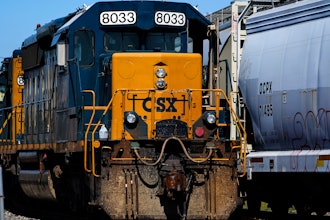WASHINGTON (AP) — The United States launched a trade complaint Thursday against China at the World Trade Organization, accusing Beijing of unfairly imposing duties on more than $3 billion in exports of American-produced automobiles.
The announcement came as President Barack Obama hit the campaign trail in the battleground state of Ohio, where automakers have been affected by the tariffs imposed in December. It underscored how America's trade relations with rising economic power China could color the political debate ahead of the November presidential election.
Under WTO rules, countries are allowed to impose punitive tariffs to offset damage from both subsidies and dumping — selling products at below market value — but the U.S. contends that in this and other cases, China has used those remedy measures in an unfair and retaliatory way to hurt American exporters.
Last month, the U.S. successfully challenged Chinese tariffs imposed on American high-technology steel products and has also disputed tariffs levied on chicken products.
White House spokesman Jay Carney told reporters Thursday that the Chinese duties cover more than 80 percent of U.S. auto exports to China and fall disproportionately on General Motors, or GM, and Chrysler because of the actions Obama took to support the auto industry during the financial crisis.
Some critics have contended that the administration's bailout of the auto sector — which has seen it return to profitability even as the wider economic recovery has stuttered — could leave U.S. products vulnerable to countervailing duties by international competitors claiming it amounted to an unfair subsidy.
China's anti-dumping and countervailing duties, imposed on autos for two years and ranging from 2 percent to 21.5 percent, affect cars and SUVs with engine capacity of 2.5 liters or larger.
A senior U.S. trade official, briefing reporters on condition of anonymity, said that in 2011, an estimated 92,000 of such autos were exported to China.
U.S. Trade Representative Ron Kirk said the U.S. has requested consultations on the issue at the WTO, the first step in raising a dispute at the international trade body. If the two sides fail to resolve the issue through consultation within 60 days, the U.S. could request a WTO trade dispute panel. A ruling in such a case could take between 18 months and two years.
Kirk said in a statement it was the latest in a series of enforcement steps by the administration "to hold China accountable for its WTO commitments."
The administration says China initiated its probe into the U.S. auto imports — leading to the imposition of the tariffs — shortly after Obama's decision in September 2009 to impose a tariff on U.S. imports of low-grade Chinese tires that was upheld by the WTO.
Chrysler said Thursday that it exported 38,373 vehicles to China last year. The Jeep Compass small SUV was its top seller in China.
Chrysler exports more vehicles from the U.S. than other automakers because it doesn't have a plant in China. By contrast, GM and its Chinese partners operate 11 plants in China, and GM makes the vast majority of the 2.5 million vehicles it sells in China in the country. It exports limited numbers of the Chevrolet Volt, Buick Encore and Cadillac CTS from the U.S., spokesman Klaus-Peter Martin said.
China and the U.S. are at odds over a slew of trade issues. In March, the U.S., the European Union and Japan brought a trade case against China over its curtailment of exports of rare earth minerals over whose production China has a virtual monopoly. Those minerals are used to manufacture hybrid car batteries, flat-screen televisions and other high-tech goods. China says curbing rare earth exports is for environmental protection, not intended to help Chinese companies.
With American manufacturers still struggling to recover from the financial crisis, and unemployment running over 8 percent, the administration is keen to show it is getting tough on discriminatory trade practices by its chief economic rival — also its main foreign creditor — blamed by many in the U.S. for a loss of American manufacturing jobs.
Republican candidate Mitt Romney has accused Obama of being too soft on China. The Obama campaign has accused Romney of outsourcing jobs to China when he ran a private equity firm.
Asked about whether Thursday's announcement was timed for political effect, Carney said the action "has been in development for many, many months" and the timing was determined by the U.S. Trade Representative's office.
The Chinese Embassy in Washington did not immediately respond to a request for comment.
In December, Chinese Commerce Minister Chen Deming described the duties on U.S.-made vehicles are legal under international rules and said if the U.S. thought otherwise it should sue.
____
Associated Press writer Dee-Ann Durbin in Detroit contributed to this report.






















